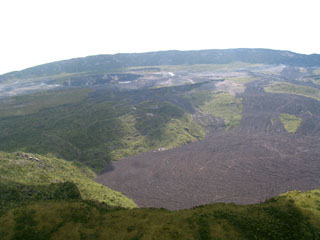Report on Nyamulagira (DR Congo) — 22 November-28 November 2006
Smithsonian Institution / US Geological Survey
Weekly Volcanic Activity Report, 22 November-28 November 2006
Managing Editor: Sally Sennert.
Please cite this report as:
Global Volcanism Program, 2006. Report on Nyamulagira (DR Congo) (Sennert, S, ed.). Weekly Volcanic Activity Report, 22 November-28 November 2006. Smithsonian Institution and US Geological Survey.
Nyamulagira
DR Congo
1.408°S, 29.2°E; summit elev. 3058 m
All times are local (unless otherwise noted)
GVO reported that on 27 November at 2200, incandescence from a new eruption of Nyamuragira was visible from Goma, about 30 km S. The intense red glow suggested lava fountaining and flows. Sustained long-period earthquake activity had been present since 26 October.
Geological Summary. Africa's most active volcano, Nyamulagira (also known as Nyamuragira), is a massive high-potassium basaltic shield about 25 km N of Lake Kivu and 13 km NNW of the steep-sided Nyiragongo volcano. The summit is truncated by a small 2 x 2.3 km caldera that has walls up to about 100 m high. Documented eruptions have occurred within the summit caldera, as well as from the numerous flank fissures and cinder cones. A lava lake in the summit crater, active since at least 1921, drained in 1938, at the time of a major flank eruption. Recent lava flows extend down the flanks more than 30 km from the summit as far as Lake Kivu; extensive lava flows from this volcano have covered 1,500 km2 of the western branch of the East African Rift.

